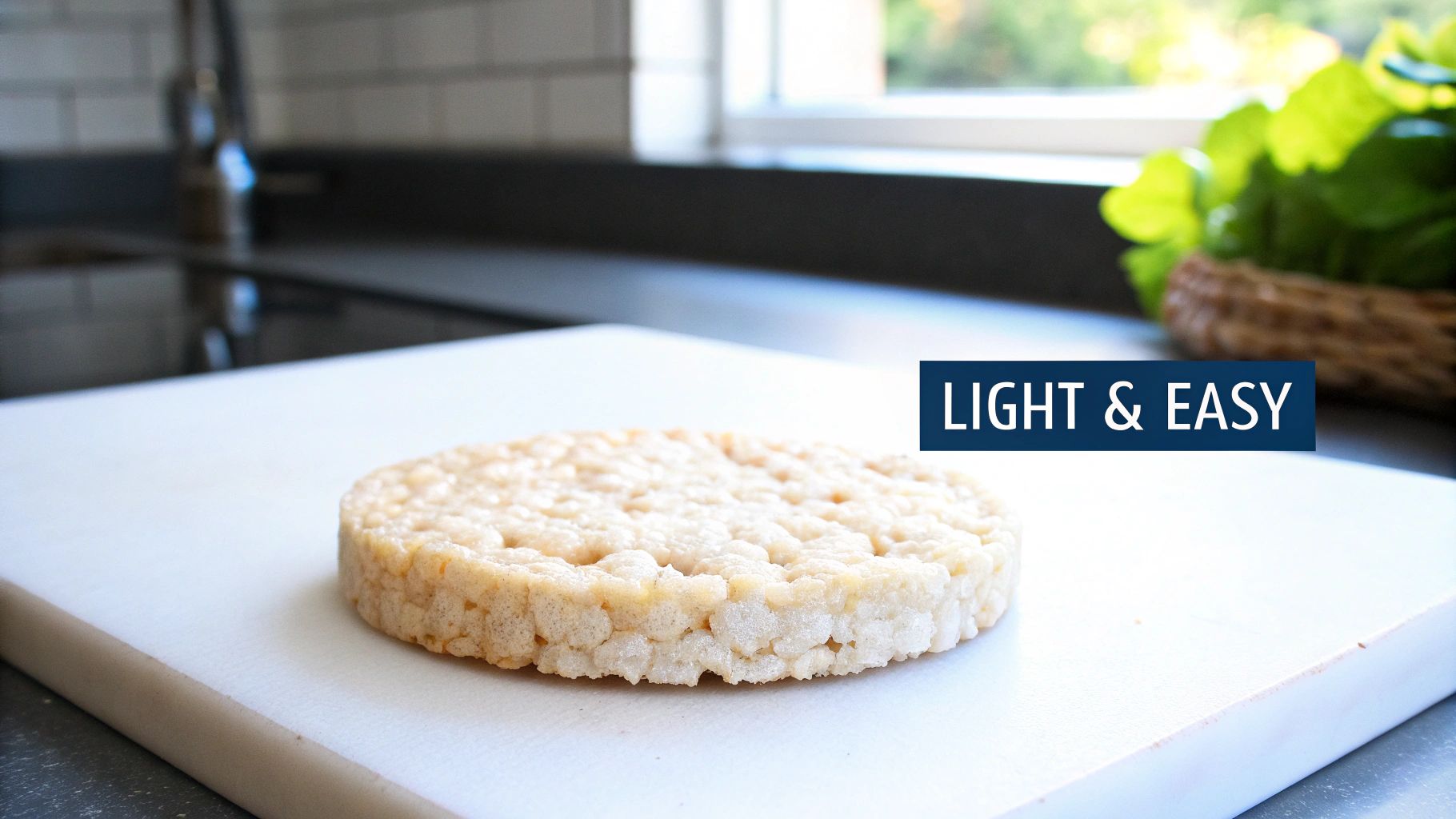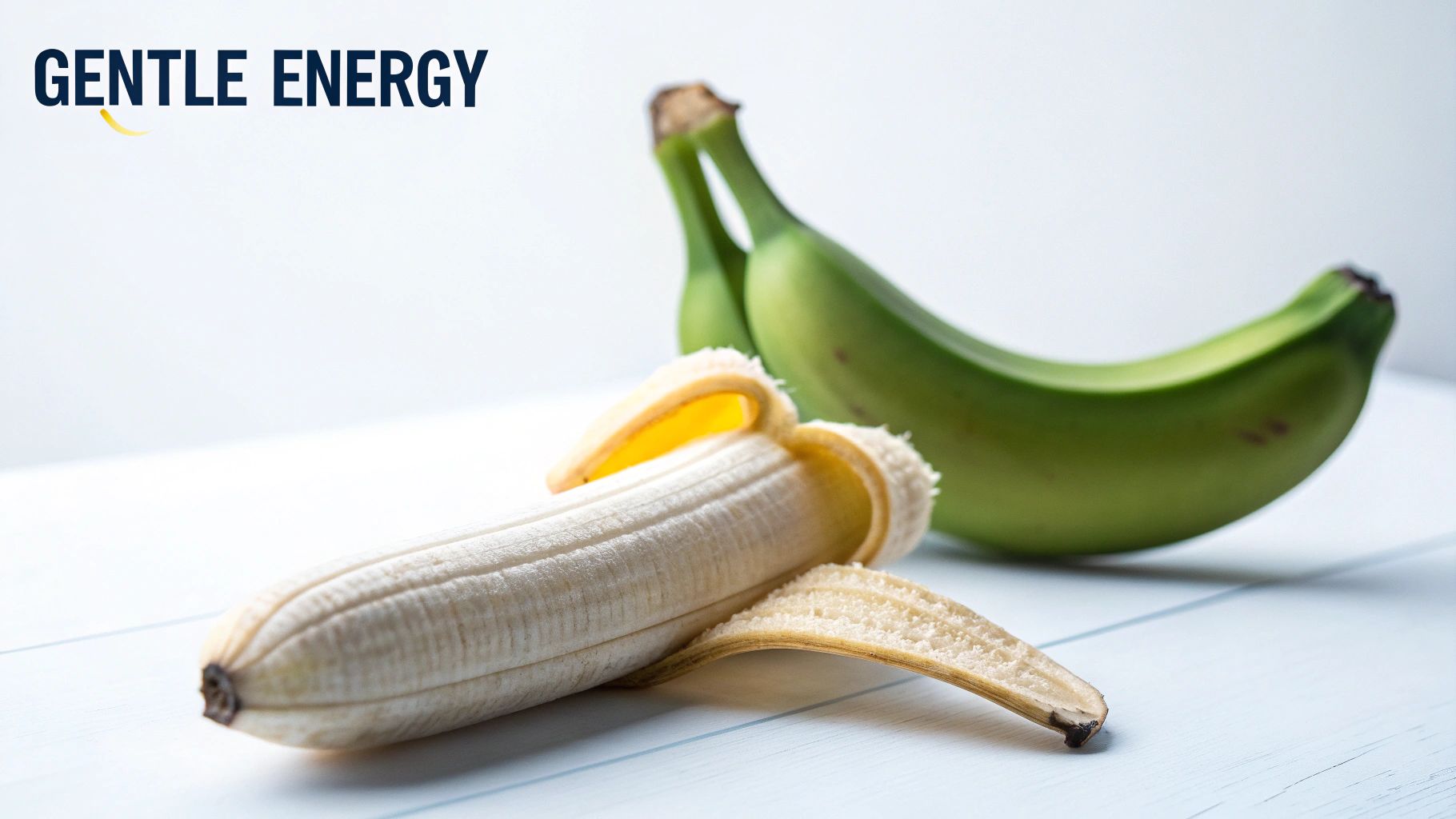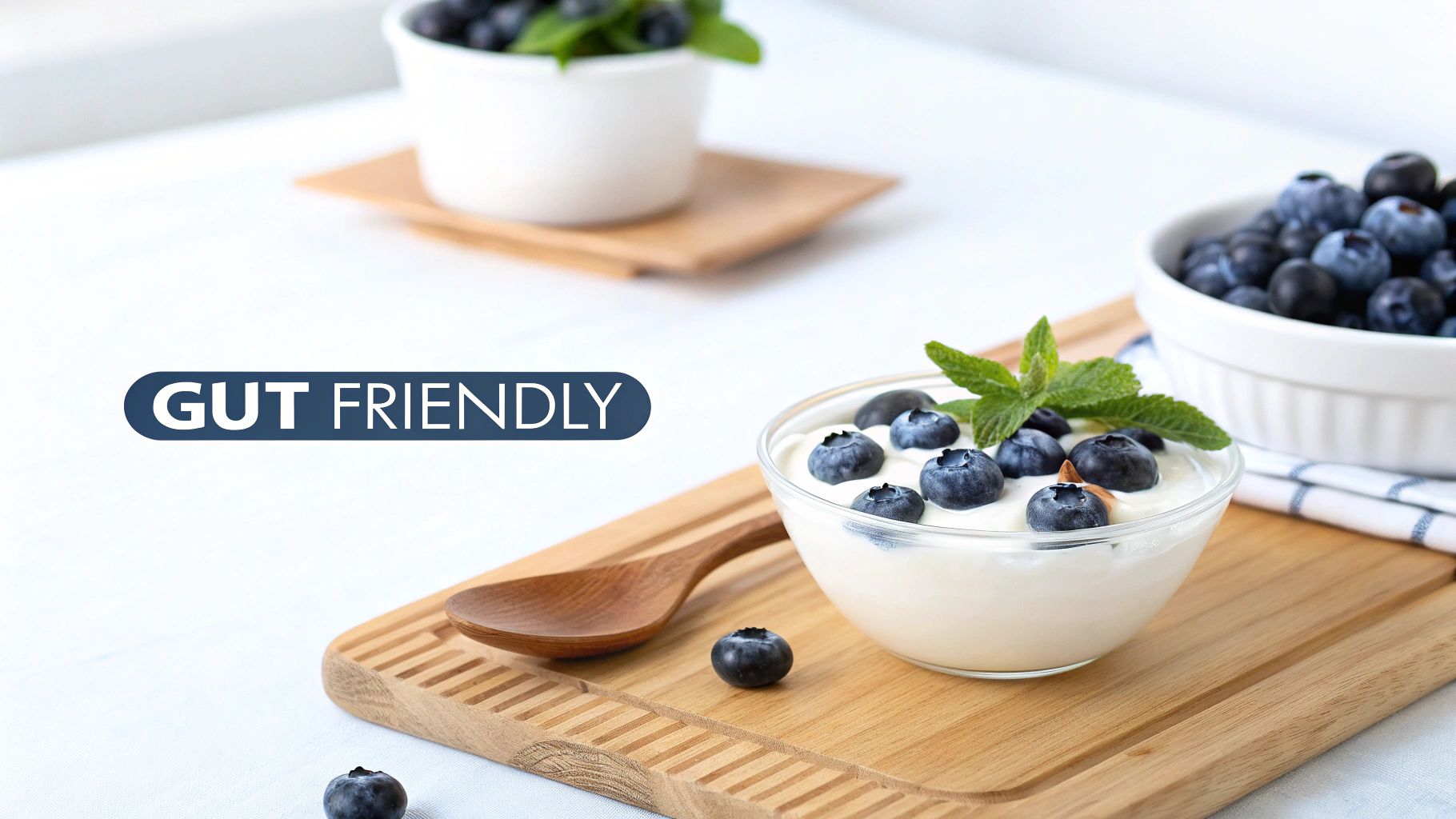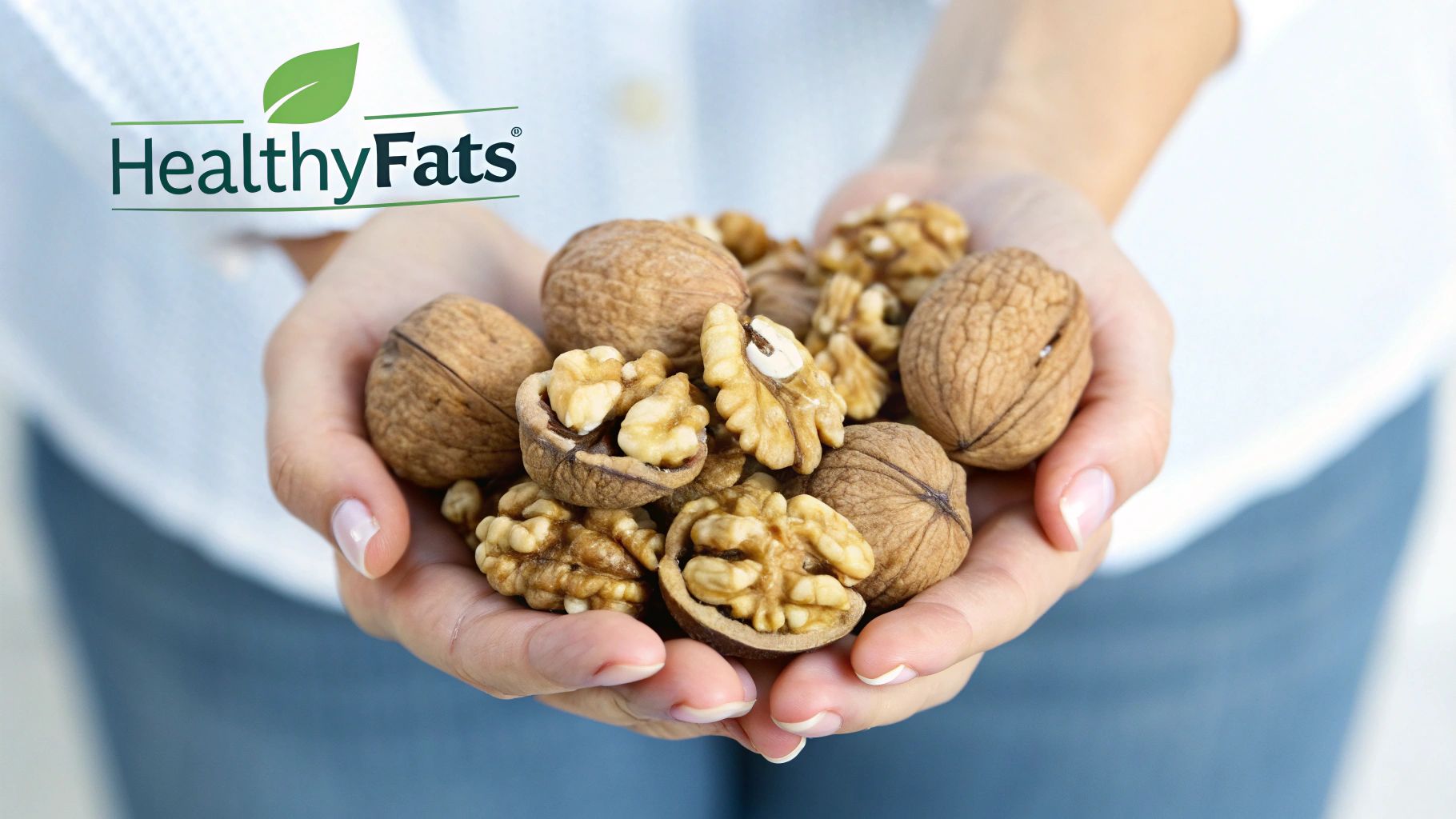Living with Irritable Bowel Syndrome (IBS) often turns a simple act like snacking into a complex puzzle. The fear of triggering cramps, bloating, or an urgent trip to the bathroom can make you wary of every bite. However, managing IBS doesn't mean giving up on satisfying, delicious snacks. The key is knowing which foods calm your gut and which ones cause chaos.
This guide is designed to demystify snacking with IBS by providing a curated list of safe, low-FODMAP options. We will explore why certain foods, like unripe bananas and homemade oat crackers, are better tolerated, how to prepare them, and the specific serving sizes that keep you in the clear. By understanding the science behind these choices, you can reclaim snack time and fuel your body without fear.
This isn't just a list; it's a roadmap to confident, comfortable eating, helping you find enjoyable snacks for IBS that support your digestive health. While our focus is on low-FODMAP foods, learning about a broader range of healthy sugar-free snack ideas can also help you make better overall dietary choices. Our goal is to provide you with actionable strategies for a more peaceful gut.
1. Plain Rice Cakes
When navigating the complex world of Irritable Bowel Syndrome (IBS), simplicity is often your greatest ally. Plain rice cakes are a cornerstone of many IBS-friendly diets, offering a reliable, gentle, and versatile snack option. These snacks are created by applying heat and pressure to rice grains, causing them to puff up into a light, crispy disc. Their minimalistic composition is precisely why they are celebrated as one of the best foundational snacks for IBS.

The primary benefit of plain rice cakes lies in their low FODMAP profile. Rice is naturally low in fermentable carbohydrates, which are the primary culprits behind IBS symptoms like bloating, gas, and abdominal pain. This makes them a "safe" food, particularly during the elimination phase of the low-FODMAP diet or during a flare-up when your digestive system is highly sensitive.
Why Plain Rice Cakes Work for IBS
Rice cakes serve as an ideal, neutral canvas for other low-FODMAP foods. Because they are plain, they don't contain hidden triggers like onion powder, garlic powder, or high-fructose corn syrup that are often found in flavored snack foods. Their bland nature is their strength, providing a satisfying crunch without irritating the gut.
Key Insight: The true value of a plain rice cake is its predictability. For someone with IBS, having a "go-to" snack that consistently causes no symptoms provides both physical relief and mental peace of mind.
How to Incorporate Rice Cakes into Your Diet
While plain rice cakes are excellent on their own, they truly shine when paired with other gut-friendly toppings. This allows you to add flavor, fat, and protein for a more satiating and nutritionally complete snack.
- Start Simple: If you're new to the low-FODMAP diet or experiencing a flare-up, begin with white rice cakes. While brown rice offers more fiber, for some individuals with IBS, this extra fiber can be an irritant. White rice is generally easier to digest.
- Check Labels Diligently: Always choose plain or lightly salted varieties. Scrutinize the ingredients list to ensure there are no added high-FODMAP flavorings. Brands like Lundberg, Quaker (plain varieties), and Kallo are often recommended.
-
Smart Topping Choices (Low-FODMAP Portions):
- Nut Butter: A tablespoon of natural peanut butter or almond butter.
- Sweet: Sliced strawberries or a few blueberries with a drizzle of maple syrup.
- Savory: A small serving of lactose-free cream cheese with a sprinkle of fresh chives.
- Protein: Sliced turkey or a hard-boiled egg.
Choosing plain rice cakes provides a safe, crunchy, and adaptable base for building satisfying snacks for IBS, ensuring you can manage your symptoms without sacrificing texture and enjoyment.
2. Bananas (Firm/Unripe)
When it comes to fruit, bananas often cause confusion for those managing Irritable Bowel Syndrome (IBS). However, the key to enjoying this convenient and potassium-rich snack lies in its ripeness. A firm, slightly under-ripe banana is a fantastic, gut-friendly option. These bananas are lower in certain sugars and higher in a specific type of fiber that can be beneficial, making them one of the most reliable fruit-based snacks for IBS.

The benefit of a firm banana is rooted in its FODMAP composition. As a banana ripens, its starches convert into sugars, specifically fructans (a type of oligosaccharide). While a ripe, brown-spotted banana is high in fructans and likely to trigger symptoms, a firm, mostly yellow banana with green tips is low in fructans. This distinction, confirmed by research from institutions like Monash University, makes it a safe choice for many during all phases of the low-FODMAP diet.
Why Firm Bananas Work for IBS
Firm bananas offer more than just a low-FODMAP profile; they contain resistant starch. This type of starch resists digestion in the small intestine and acts as a prebiotic, feeding beneficial bacteria in the large intestine. This process can help promote a healthier gut microbiome without the rapid fermentation that causes gas and bloating.
Key Insight: Choosing a banana based on its ripeness empowers you to control your FODMAP intake. A firm banana provides portable energy and nutrients without the high sugar load that can disrupt a sensitive gut.
How to Incorporate Firm Bananas into Your Diet
Selecting and eating bananas correctly is crucial for avoiding IBS symptoms. This simple fruit can be a grab-and-go snack or a component of a larger, balanced meal. For those looking to build a comprehensive eating strategy, understanding how foods like firm bananas fit into a larger framework is essential. You can learn more about building a complete and balanced IBS diet plan on cantein.com.
- Choose Wisely: Opt for bananas that are yellow but still firm to the touch, ideally with some green near the stem. Avoid any bananas with brown spots, as this indicates higher fructan content.
- Mind Your Portions: If you are reintroducing foods or are particularly sensitive, start with half a medium-sized firm banana (around 50g) to assess your tolerance before moving to a full one.
- Eat Mindfully: Always chew thoroughly to aid digestion. Eating slowly allows your digestive system to process the food more effectively.
-
Smart Pairing Choices:
- Balance Blood Sugar: Pair slices of a firm banana with a tablespoon of natural peanut butter or a small handful of walnuts to add protein and healthy fats.
- In a Meal: Slice it over lactose-free yogurt or into a smoothie with low-FODMAP protein powder.
- On the Go: Enjoy it on its own as a simple, energy-boosting snack.
Firm, unripe bananas are excellent snacks for IBS, offering a sweet taste and satisfying texture while supporting your digestive health.
3. Lactose-Free Greek Yogurt with Blueberries
Finding a creamy, protein-rich snack that doesn't trigger IBS symptoms can feel like a major victory. Lactose-free Greek yogurt with a small serving of blueberries offers a nutritionally dense option that supports gut health without the common pitfalls of dairy. This snack works by removing lactose, the sugar in milk that many people with IBS struggle to digest, while retaining the protein and beneficial probiotics of traditional Greek yogurt.

The combination of protein and probiotics makes this one of the most functional snacks for IBS. The live active cultures can contribute to a healthier gut microbiome over time, while the high protein content helps keep you full and satisfied, preventing you from reaching for less suitable, processed snacks. Blueberries, in a controlled portion, add natural sweetness, fiber, and powerful antioxidants.
Why Lactose-Free Greek Yogurt with Blueberries Works for IBS
The key is the removal of lactose. During production, an enzyme called lactase is added to the yogurt, which pre-digests the lactose, making it easily absorbable. This sidesteps the fermentation process in the gut that would otherwise cause gas, bloating, and diarrhea in lactose-intolerant individuals. Blueberries are also considered low FODMAP at a 1/4 cup (40g) serving, making them a safe fruit topping.
Key Insight: This snack provides a double benefit: it avoids a common trigger (lactose) while actively delivering beneficial elements (probiotics and protein) to support long-term gut balance and digestive comfort.
How to Incorporate Lactose-Free Greek Yogurt into Your Diet
Careful selection and portion control are crucial for making this snack work for your sensitive system. Not all yogurts are created equal, and even safe foods can cause issues in large quantities.
- Choose Plain and Unsweetened: Always opt for plain, unsweetened lactose-free Greek yogurt. Flavored varieties often contain high-FODMAP ingredients like high-fructose corn syrup, fruit concentrates, or artificial sweeteners (like sorbitol or xylitol) that can trigger symptoms.
- Verify the Probiotics: Look for yogurts that list "live and active cultures" on the label. Brands like Fage Total 0% Lactose Free, Chobani Complete Lactose-Free, and Two Good Lactose-Free are excellent choices known for their gut-friendly profiles.
- Portion Your Toppings: Stick to the recommended low-FODMAP serving size for blueberries, which is 1/4 cup (40g). This amount provides flavor and nutrients without overloading your system with fructose.
- Test Your Tolerance: If you're reintroducing foods, start with a small spoonful of yogurt and a few blueberries to see how your body reacts before committing to a full serving. Some individuals also find that eating yogurt at room temperature is gentler than when it's ice-cold.
4. Handful of Walnuts
When searching for satisfying snacks for IBS that deliver nutritional power, a small portion of walnuts is an excellent choice. These brain-shaped nuts are packed with healthy fats, protein, and fiber, making them a satiating option that can keep hunger at bay. More importantly, they offer specific benefits that can be particularly helpful for those managing digestive distress, including anti-inflammatory properties.

The key benefit of walnuts is their low FODMAP status in controlled portions. A serving of up to 10 walnut halves (30g) is considered safe for most people on a low-FODMAP diet. This allows you to reap their nutritional rewards without triggering the common IBS symptoms of gas, bloating, and pain. They are particularly rich in omega-3 fatty acids, which are known for their anti-inflammatory effects that may help soothe an irritated gut lining.
Why a Handful of Walnuts Works for IBS
Walnuts provide a combination of fat and protein that promotes satiety, helping to prevent overeating or reaching for less gut-friendly, processed snacks. Their unique composition, especially their high omega-3 content, sets them apart from other nuts. This makes them not just a snack, but a functional food that can contribute positively to your gut health strategy, a concept often explored by functional medicine practitioners.
Key Insight: Portion control is everything. The difference between a safe, beneficial snack and a potential trigger lies in sticking to the recommended serving size. Pre-portioning walnuts into small bags can prevent accidental overconsumption.
How to Incorporate Walnuts into Your Diet
Integrating walnuts into your snack routine is simple, but a few guidelines will ensure they remain a friendly choice for your digestive system.
- Mind Your Portions: The most crucial rule is to limit your serving to 10 walnut halves (or about 30g). This is the low-FODMAP-certified amount. Use a food scale initially to get a feel for the right portion size.
- Choose Plain Varieties: Always opt for raw or dry-roasted walnuts. Scrutinize labels to avoid flavored or seasoned versions, which often contain high-FODMAP ingredients like onion powder, garlic powder, or honey. Brands like Diamond or Kirkland offer plain options.
- Chew Thoroughly: Take your time and chew each walnut well. This breaks them down mechanically, making them easier for your digestive system to process.
-
Smart Pairings (Low-FODMAP Portions):
- With Fruit: Mix with a handful of blueberries or a few slices of firm banana.
- In Yogurt: Sprinkle crushed walnuts over a serving of lactose-free Greek yogurt.
- As a Topping: Add to a small bowl of oatmeal made with water or lactose-free milk.
- For more insights into beneficial ingredients, you can explore some of the best gut health supplements for better digestion.
By carefully managing your serving size, a handful of walnuts can be one of the most nourishing and satisfying snacks for IBS, providing lasting energy and valuable nutrients.
5. Homemade Oat Crackers
Finding a store-bought cracker that doesn't irritate the gut can feel like a scavenger hunt. Many commercial options are loaded with high-FODMAP ingredients like wheat flour, onion powder, garlic powder, or honey. Homemade oat crackers offer a simple, satisfying, and completely controllable alternative, making them an excellent choice for anyone looking for reliable snacks for IBS. By making them yourself, you control every single ingredient, ensuring they are free from personal triggers.
The key benefit of oat crackers is their primary ingredient: oats. Oats are low in FODMAPs in appropriate serving sizes (up to ½ cup of rolled oats) and contain a beneficial soluble fiber called beta-glucan. This type of fiber can help regulate bowel movements, which is particularly helpful for individuals experiencing both constipation (IBS-C) and diarrhea (IBS-D). Beta-glucan also acts as a prebiotic, feeding beneficial gut bacteria.
Why Homemade Oat Crackers Work for IBS
Unlike complex commercial recipes, a basic oat cracker can be made with just four ingredients: rolled oats, water, olive oil, and salt. This simplicity eliminates the risk of hidden irritants. The soluble fiber in oats forms a gel-like substance in the digestive tract, which can help soothe the gut lining and promote more regular, comfortable digestion. This makes them a more nutritionally robust option than many refined grain snacks.
Key Insight: The power of homemade oat crackers lies in their customizability. You can adjust the fiber content, flavor, and texture to perfectly match your digestive system's tolerance levels on any given day.
How to Incorporate Oat Crackers into Your Diet
Creating these crackers is straightforward, even for novice bakers. The key is to start simple and observe how your body responds before adding more complex ingredients.
- Start with a Basic Recipe: Blend rolled oats into a flour, then mix with water, olive oil, and salt to form a dough. Roll it out thinly between two sheets of parchment paper and bake until crisp.
- Assess Fiber Tolerance: Oats are fibrous. Begin with a small serving of 2-3 crackers to see how your system handles them. If you have celiac disease or a non-celiac gluten sensitivity, ensure you use certified gluten-free oats.
-
Smart Flavor Additions (If Tolerated):
- Herbs: Add a teaspoon of dried rosemary or thyme to the dough for a savory flavor.
- Seeds: Incorporate a tablespoon of chia seeds or pumpkin seeds for extra crunch and nutrients, but only if you know you tolerate them well.
- Toppings: Pair with a slice of firm cheddar cheese, a dollop of lactose-free cottage cheese, or a spoonful of natural peanut butter.
Making your own oat crackers provides a safe, fiber-rich, and crunchy snack. For more gut-friendly meal ideas, you can explore other delicious low FODMAP recipes for gut relief.
6. Peppermint Tea with Ginger Snaps (Homemade)
Some snacks for IBS do more than just avoid triggering symptoms; they actively work to soothe them. The combination of warm peppermint tea and a few small, homemade ginger snaps is a perfect example of a therapeutic snack. This pairing leverages the natural medicinal properties of peppermint and ginger to calm an irritated gut, making it a powerful tool for symptom management.
Peppermint contains menthol, a natural compound known for its antispasmodic effects, which can relax the muscles of the digestive tract and ease cramping. Ginger is a well-regarded carminative, meaning it helps to expel gas, reduce nausea, and support overall digestion. By making the ginger snaps at home, you maintain complete control over the ingredients, ensuring they are low FODMAP and free from common triggers like molasses or high-fructose corn syrup.
Why Peppermint Tea and Ginger Snaps Work for IBS
This snack combination works on two fronts: peppermint directly addresses pain and cramping, while ginger aids digestion and reduces feelings of nausea and bloating. Homemade ginger snaps provide a light, crunchy vehicle for the ginger and offer a small amount of carbohydrate for energy without overwhelming the system. It’s a functional snack designed for relief.
Key Insight: Unlike many passive snacks for IBS, this pairing is an active intervention. Drinking peppermint tea and eating ginger snaps can be a go-to ritual during a flare-up or when you feel symptoms beginning to arise, helping you manage discomfort proactively.
How to Incorporate This Snack into Your Diet
Creating this soothing combination is simple and allows for customization based on your specific sensitivities and preferences.
- Choose the Right Tea: Opt for pure peppermint tea without added artificial sweeteners or chicory root, which can be a trigger. Brands like Traditional Medicinals and Celestial Seasonings offer 100% peppermint leaf options. For maximum benefit, consider steeping fresh mint leaves.
- Bake Your Own Snaps: Use a gluten-free flour blend or rice flour as the base. Sweeten with a low-FODMAP option like maple syrup and use plenty of ground ginger or finely grated fresh ginger for potency. Keep the cookies small, around 1-2 inches, to manage portion size.
-
Timing is Key:
- For Proactive Relief: Enjoy this snack 30-60 minutes before a meal to help prepare your digestive system.
- For Symptom Management: Drink the tea and have a couple of snaps when you feel cramping, bloating, or nausea setting in.
- As a Soothing Ritual: A warm cup of peppermint tea before bed can help prevent overnight discomfort.
This combination of peppermint tea and homemade ginger snaps is more than just a safe snack; it's a gentle, natural remedy that provides comfort and targeted relief from IBS symptoms.
6-Item IBS Snack Comparison
| Snack Item | Implementation Complexity 🔄 | Resource Requirements ⚡ | Expected Outcomes 📊 | Ideal Use Cases 💡 | Key Advantages ⭐ |
|---|---|---|---|---|---|
| Plain Rice Cakes | Low – ready to eat, no preparation | Minimal – just purchase | Gentle digestion, quick energy, low IBS risk | Convenient, on-the-go, IBS-friendly crunchy snack | Widely tolerated, gluten-free, shelf-stable |
| Bananas (Firm/Unripe) | Very low – no preparation needed | Minimal – just purchase | Sustained energy, supports gut bacteria | Natural sweet snack, electrolyte replenishment | Low FODMAP if firm, rich in potassium |
| Lactose-Free Greek Yogurt with Blueberries | Medium – requires portion control and pairing | Moderate – needs refrigeration | Protein-rich, probiotic support, antioxidant | Protein snack, gut health support | Probiotics, high protein, low FODMAP |
| Handful of Walnuts | Low – ready to eat | Minimal – purchase, portion control | Anti-inflammatory, satiety, gut microbiome support | Healthy fat source, IBS-friendly snacking | Omega-3 rich, portable, nutrient dense |
| Homemade Oat Crackers | Medium – requires baking | Moderate – ingredients and baking time | Fiber support, bowel regulation | Homemade control, crunchy fiber snack | Customizable, gluten-free, fiber-rich |
| Peppermint Tea with Ginger Snaps (Homemade) | Medium – tea brewing and baking required | Moderate – ingredients and preparation | IBS symptom relief, digestion aid | Soothing, calming snack for IBS flare-ups | Natural antispasmodic, digestive aid |
Your Action Plan for Symptom-Free Snacking
Navigating the world of snacking with Irritable Bowel Syndrome can often feel like a complex puzzle. However, by arming yourself with knowledge and a strategic approach, you can transform snack time from a source of anxiety into a moment of nourishing relief. The options we've explored, from the simple crunch of a plain rice cake to the soothing combination of peppermint tea and homemade ginger snaps, serve as your foundational toolkit. Each one is intentionally selected based on low-FODMAP principles to minimize digestive distress while providing valuable nutrients.
The core lesson is this: personalization is everything. While this list provides a safe and effective starting point, your digestive system is unique. What constitutes one of the best snacks for IBS for you will be confirmed through your own careful experience. This guide is not a restrictive diet but a flexible framework designed to empower you.
Creating Your Personalized Snacking Strategy
To move forward with confidence, adopt a methodical approach. Instead of overhauling your entire snack routine at once, introduce just one new item from this list at a time.
- Start Small: Begin with the recommended portion size, such as half of a firm banana or a small handful of walnuts. This helps isolate variables and pinpoint exactly how your body reacts.
- Keep a Journal: For a few days after introducing a new snack, log your symptoms. Note the time you ate, the portion size, and any digestive feedback, whether positive or negative. This data is invaluable for identifying your personal trigger foods and safe havens.
- Listen to Your Body: Pay close attention to subtle cues. Bloating, gas, or discomfort are clear signals to reassess. Conversely, feeling energized and comfortable is a sign you’ve found a winning option.
Key Takeaway: The goal isn't just to avoid symptoms but to actively build a resilient digestive system. Consistent, mindful choices create a positive feedback loop, reducing inflammation and fostering a healthier gut environment over time.
Beyond Snacking: A Holistic View of Gut Health
Mastering your snack choices is a critical component of managing IBS, but it's one piece of a larger wellness picture. The principles of portion control, ingredient awareness, and mindful eating extend to all your meals. For a comprehensive approach to managing IBS, consider exploring broader evidence-backed methods on How to Heal Your Gut: Expert Tips for Wellness. Understanding the complete ecosystem of your digestive health will amplify the benefits of finding your perfect snacks for IBS.
By embracing this journey of experimentation and self-awareness, you reclaim control over your health. You move from a reactive state of damage control to a proactive state of empowerment, confident in your ability to nourish your body without fear. Your path to happy, symptom-free snacking starts with the very next bite.
Ready to enhance your gut-friendly snacks with a clean, high-quality protein boost? Cantein offers an easily digestible, plant-based hemp protein perfect for adding to lactose-free yogurt or homemade recipes without causing digestive upset. Fortify your journey to better gut health by visiting Cantein to explore your options.

